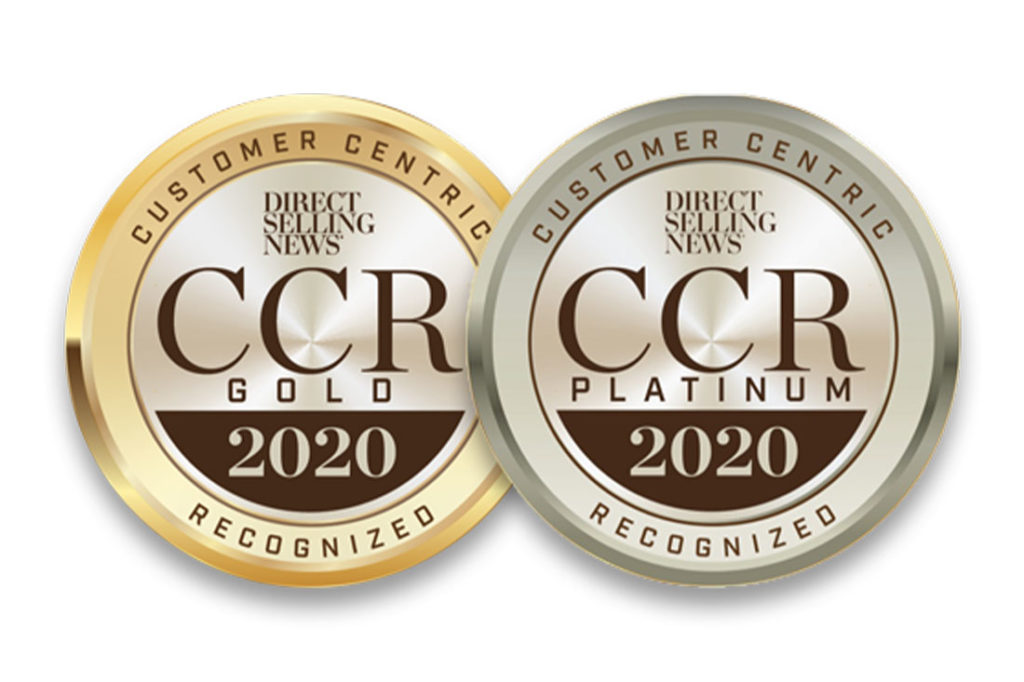Standing up to Customer Expectations, Regulatory Scrutiny and Sustainability Goals
History circles back on itself. The commonplace gets modified over time with newer methodologies, but transformation—even in the world of direct selling—meanders through trial and error and sometimes re-emerges closer to the beginning than we expected.
Door-to-door sellers of the late 1800s introduced innovative, useful and pampering products to often isolated and ever-curious customers. That’s how the direct selling industry was born.
Selling products direct—where retail couldn’t or wouldn’t stretch—lightened consumers’ already heavy load. Quality products earned a loyal customer base for the sellers—often with regular routes—and the companies that would become household names: Fuller Brush, J.R. Watkins Co., Stanley Home Products, and later Tupperware, Avon, Mary Kay and the like.
As more than a century of industry transformation unfolded, the focus on customers waxed and waned. Never completely out of mind, customers sometimes fell down the list to other business model priorities. Some direct selling companies and their independent distributors experimented with financial growth strategies that became problematic, controversial and subject to scrutiny by regulators.
Amid the switchbacks taken by some companies, however, legacy direct selling businesses flourished by focusing on selling and servicing customers and sponsoring people who wanted to do the same thing. Central to their success was a business model based on actual customers buying real products.
Today, these types of companies identify as customer-centric—a newer label for something that’s been around in direct selling as long as the industry itself. Customer-centric companies possess really attractive products that disrupt traditional businesses to the benefit of the consumer, and they represent a 21st century direct selling business model that stands up to the expectations of customers, regulatory scrutiny and the sustainability goals for companies and the larger industry.
“As we march into a very different future, one where technology has changed the game, a new type of focus on customer acquisition and retention just makes sense. No business succeeds and achieves sustainable success without a strong base of real consumers,” says John Fleming, owner of Ideas and Design Group, LLC; former DSN Publisher and Editor-in-Chief; and former Avon executive.
WHAT CUSTOMER-CENTRIC LOOKS LIKE TODAY?
Customer-centric companies embrace their ability to fill a void in today’s marketplace, taking aim outside the channel to compete through product efficacy, value, impact and service. Product performance, pricing, packaging, marketing, customer service, shipping time and costs, loyalty programs and rewards—all of it aims to benefit, engage and retain the consumer. These companies invest in, focus on, track, and measure every facet in order to meet today’s consumer expectations.
“This is worth getting good at! The benefits to the company and the field organization can be massive, long-lasting and far-reaching. Repeat customer purchases create repeat sales and increased revenues. Customer-centric growth is typically more profitable and stable,” says Garrett McGrath, president of Elepreneurs.
Bouncer Schiro, CEO of Kynect, says the lifetime value per customer is exponentially greater as well. But the customer centric approach isn’t without its hurdles. “In the early days, our biggest challenge was that we were simply growing too fast. Our systems couldn’t keep up, but we solved most of those issues by listening to and focusing on the needs of our customer.”
“A quality product that provides high value is essential to get the consistent ongoing purchases from your ever-growing customer base. The most significant elements to get us there were first of all to ensure that our compensation plan was focused on customer acquisition and ongoing customer sales.
Secondly, we needed to have direct and consistent communication with our customer base around what about our products they like, what new products they were looking for and how we enhanced our preferred customer program,” says Stuart MacMillan, president of MONAT Global.
Customers are empowered these days, and their expectations are evolving. They find products and services at a click or with a simple voice command through e-commerce platforms. Most growing direct selling companies have robust customer acquisition and retention abilities online, as well as sophisticated point-of-sale systems that capture customer information and feeds data for all sales motions back to the home office.
“Direct selling companies that recognize themselves as platforms and provide the digital tools which enable distributors to market in a more personal manner will support a redefining of the direct selling model,” says Fleming.
QUICKENING THE PACE OF TRANSFORMATION
Technology is facilitating a transformation of the direct selling model, but it’s regulatory scrutiny that is—or should be—quickening the pace of companies to lean in to their customers.
The MLM regulatory landscape shifted in the U.S. with Federal Trade Commission lawsuits filed against Vemma Nutrition (2015) and Herbalife (2016), and more recently AdvoCare and Neora. These cases reflect a heightened scrutiny of both MLM compensation structures and unsubstantiated earnings claims. Companies have paid hundreds of millions of dollars in restitution; spent millions overhauling operational systems; restructured compensation plans; and in AdvoCare’s case, dismantled its MLM structure entirely.
While this type of scrutiny is not new, Brent Kugler, attorney with Scheef and Stone, says, “Today’s MLM company must have a compensation plan that in structure, practice and terminology emphasizes compensation and rewards based upon bona fide retail sales activity. Just as importantly, MLM companies should accurately and transparently disclose the earning or lack of earnings of all program participants, not just the participants who earned commissions in a given time period.”
The FTC has made clear that it intends to hold companies responsible for improper earnings claims made by their distributors and to expect aggressive scrutiny of MLM compensation plans that include threshold-based and duplication-based rewards.
Older comp plans that define volume and base rewards on distributor purchases need revision and rewriting to emphasize retail sales and rewards to distributors for verified retail sales activity instead. Calculations of distributor commissions, likewise, should generate from retail sales to non-distributors and omit personal purchase volume because it no longer counts in rank advancement. MLM purchase requirements should also change to minimum sales requirements.
“In the current regulatory environment, every MLM company needs to be taking a hard look at its compensation model and how it is deriving its revenues,” says Kugler. Recent FTC rulings indicate that companies—to remain compliant and not be labeled as pyramid schemes—must demonstrate actual retail demand for its products and services. This means a healthy majority of company revenues should be generated from bona fide sales to actual, non-distributor customers. Ideally, a customer-to-distributor ratio of 5:1 or higher is the aim, says Kugler.
DISTINGUISHING BETWEEN ICING AND CAKE
“The customer purchase decision must be able to stand on its own as a ‘fair trade,’ and then the personal touch by a caring consultant and the opportunity to earn by also supporting customers’ purchases is the icing, not the cake,” says Orville Thompson, co-owner and co-CEO of Scentsy.
Direct selling business models need to distinguish between icing and cake in order to remain FTC compliant. Customers do not have a representation agreement in place with a direct selling company. Distributors do have an agreement in place with a direct selling company. Differentiating and tracking purchases of active customers and distributors is vital because “actual” customers engage, purchase and continue to do so for enjoyment, not for the purpose of qualifying for some component of a compensation plan.
“The entire validity of direct selling is predicated on real customers, buying real products at real prices. By focusing on the customer and the product or service value being provided to them, companies can make decisions that bring sound business results while enhancing the direct selling environment,” says Thompson.
“If the product is relevant, distinguished and desired, then people will want it without having to start a home-based business. Indeed, if a direct sales company truly loved its distributors, it would ensure they succeed by having a high percent of their business done through retail sales,” says Jeff Bell, CEO of LegalShield.
“The only real money in direct sales is from a consumer who is engaged, satisfied and retained. Having a model focused upon signing up distributors is not only reckless but potentially illegal,” he adds.
“I believe that the days of just selling opportunity are long gone and that we have to lead with customer experience, customer education, and customer value,” says Brian Underwood, owner and CEO of Prüvit.
“If education and growth aren’t the focus and you build it based on the deal or opportunity, there is always another million-dollar deal out there, right around the corner. It doesn’t create any real new value or innovation,” he adds.
THE BENEFIT OF RAVING FANS AND CUSTOMERS
Distributors need valuable and innovative products and services to build a strong book of business. A high level of consumer experience generates repeat sales of in-demand products, and those loyal customers become the heroes of customer-centric direct selling companies.
“It Works! is a customer generating machine!” says Mark Pentecost, CEO. “This year, we’ve hit record sales with 75 percent of all of our sales coming from customers. That is industry changing!” They boast a 9:1 customer -to -distributor ratio.
“I think every company that has succeeded at a massive level is because of the benefit of having raving fans and customers. Raving fans share their passion with other people, which helps continue the company’s growth,” says Underwood.
“If you focus first on the value you’re offering your customers, your business proposition becomes more powerful and sustainable. Kynect’s customer-to-Associate ratio is 9:1, not because of the FTC’s influence but because our main focus is creating value for our end users. Then we worry about the business opportunity,” says Schiro.
“Customers have always been important to sustainable business growth. In our space—and in these unprecedented times—companies who produce impactful, affordable products and serve their customers well are outperforming those who are not. FTC Guidelines are pointing all direct selling companies in this direction. This IS the future of our industry,” says McGrath.
RECOGNIZING CUSTOMER- FIRST COMPANIES
With that future in mind, Direct Selling News launches a new Customer Centric Recognition program celebrating direct selling companies that boast high customer-to-distributor ratios and prioritize actual customer sales.
“Businesses built on customer acquisition and retention, especially those that meet the 5:1 and 10:1 customer to- distributor qualifications of DSN’s CCR will be the competitors to beat in this marketplace and environment,” says Stuart Johnson, founder and CEO, SUCCESS Partners.
“What gets measured—and recognized—gets done. With Direct Selling News having created the Customer Centric Program to recognize customer-first companies, it cannot help but have a positive impact on our profession,” says McGrath.
“More than two million people have felt the Total Life Change through our products, and we are hungry for more to experience it. That’s why we are so excited to be a part of this DSN effort and doing what’s right for our customers, our Life Changers, and our entire industry,” says John Licari, COO of Total Life Changes.
“DSN’s recognition has been a strong driver to company behavior for many years. Direct selling organizations have strived for the recognition and rewards that DSN has offered. As the direct selling channel faces increased scrutiny, we are super supportive of DSN’s focus on customer acquisition and retention. We believe this will be instrumental in focusing companies on healthy, long-term sustainable growth and enhance the reputation of a channel we have come to appreciate and so many millions of people rely on,” says MacMillan.
“It is so exciting to launch a recognition of the values, integrity and behaviors that will move our industry into a more sustainable future,” says Johnson.
The new CCR Program will be open to companies with a minimum of one year in business and $5 million in annual revenue. Active customers and distributors are limited to those in the U.S. and Canada. More details can be found at www.directsellingnews.com/ccr/.
RE-EMERGING MORE VIBRANT THAN BEFORE
But actual transformation takes more than recognitions. In this regulatory environment customer centric-ish won’t be enough for the direct selling industry to re-emerge more vibrant than before.
“Customer acquisition, service and retention shouldn’t be the window dressing. It should be the absolute foundation of who we are!” says Andy McWilliams, CEO of RevitalU. He believes subtraction is necessary too. “Get rid of fees to join, big pack purchases and recruitment bonuses thinly veiled by customer acquisition minimums! LET’S CHANGE!!”
The days of direct sellers purchasing inventory and servicing customers personally is falling away. More companies are facilitating purchases and fulfilling orders for their distributors—while at the same time changing distributors’ customer acquisition expectations. Fleming says 20 or more loyal customers, who purchase frequently, is certainly the possibility for any direct seller who focuses on customer acquisition and retention.
“This changes the game and becomes foundational to a future that appears to be bigger and brighter. Those who aspire to be micro-entrepreneurs, or even entrepreneurs, will benefit from sharing with others this unique model, and sponsoring others who adopt the new behaviors. More focus on customer acquisition and retention will result in a much stronger business model for all involved. It’s exciting. Direct selling will also become a much more vibrant player in the general marketplace!” says Fleming
aspire to be micro-entrepreneurs, or even entrepreneurs, will benefit from sharing with others this unique model, and sponsoring others who adopt the new behaviors. More focus on customer acquisition and retention will result in a much stronger business model for all involved. It’s exciting. Direct selling will also become a much more vibrant player in the general marketplace!” says Fleming




